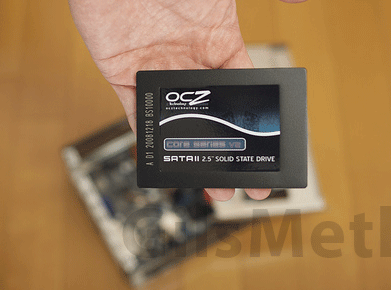 If you haven’t heard of solid state drives (SSDs) yet, the news is pretty exciting: a hard drive with no moving parts, less power usage, and exceptional speed. As you probably know, a standard hard drive (HDD) is magnetic and relies on movement to do its job, making it slow and unreliable compared to the SSD. The solid state innovation sounds like an amazing feat, and it is – however, as with any new technology, the SSD has its disadvantages. If you’re thinking about buying SSDs or just want to find out more about them, here are some of the most significant pros and cons for personal use.
If you haven’t heard of solid state drives (SSDs) yet, the news is pretty exciting: a hard drive with no moving parts, less power usage, and exceptional speed. As you probably know, a standard hard drive (HDD) is magnetic and relies on movement to do its job, making it slow and unreliable compared to the SSD. The solid state innovation sounds like an amazing feat, and it is – however, as with any new technology, the SSD has its disadvantages. If you’re thinking about buying SSDs or just want to find out more about them, here are some of the most significant pros and cons for personal use.
Benefits
Longevity – without moving parts, an SSD is more likely to survive years of use than a regular HDD.
Speed – an SSD offers a noticeably faster boot and application launch, and it’s especially useful if you do a lot of multitasking and/or watch videos frequently. In other words, gamers, you’re going to want one.
Low power usage – again, it’s that nifty “no moving parts” innovation that makes the SSD look so good. You might be able to save some energy by decreasing the amount of power needed by your hard drive, but it probably won’t be significant.
Quietness – SSDs are essentially noiseless, so if you have a loud hard drive that frustrates you, an SSD might become a strong temptation.
Small size – many SSDs are smaller than their HDD counterparts, which makes them ideal for laptops and other small gadgets that need compact storage.
Disadvantages
Price – this is definitely the biggest drawback. Where an HDD will usually cost you around 20-30 cents per gigabyte, an SSD weighs in at $3 per gigabyte. That’s a pretty big difference, and it means that you’ll probably spend $300 on a “cheap” 120GB SSD when you could get a 300GB HHD for under $100. But that’s usually the case with new technology, so the outlook might improve if you give it some time.
Low capacity – even if you do plunk down the $300 for 120GB, you’re left with a storage capacity problem. You can’t store much on that SSD, so you’ll probably have to spend more on one with a larger capacity. You might also try storing the rest of your data on an external hard drive, but that could reduce your SSD benefits (you’re just adding a “slow” HDD to the equation).
Usage-specific benefits – if you don’t multitask (try to start 17 applications at once and then switch back and forth among them like a maniac while watching 3 videos), you probably won’t notice the increased speed of the SSD unless you’re booting.
The Verdict
Like most things, the SSD isn’t a good choice for everyone; however, based on your needs, you might find it worth the price. Consider things like your usage habits, how much you value speed, what kind of data you store on your hard drive, how many hard drives you have (any backups?), and how much money you want to spend. Ultimately, it depends on your personal tastes and needs, so the best thing you can do is to consider them carefully before making a decision.
Maria Rainier is a freelance writer and blog junkie. She is currently a resident blogger at First in Education and performs research surrounding online degrees. In her spare time, she enjoys square-foot gardening, swimming, and avoiding her laptop.




